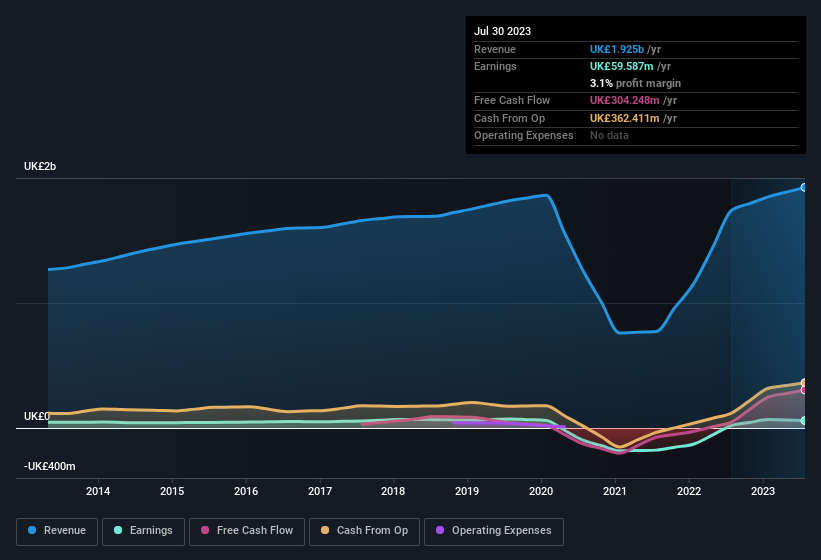The excitement of investing in a company that can reverse its fortunes is a big draw for some speculators, so even companies that have no revenue, no profit, and a record of falling short, can manage to find investors. But the reality is that when a company loses money each year, for long enough, its investors will usually take their share of those losses. Loss making companies can act like a sponge for capital - so investors should be cautious that they're not throwing good money after bad.
If this kind of company isn't your style, you like companies that generate revenue, and even earn profits, then you may well be interested in J D Wetherspoon (LON:JDW). While profit isn't the sole metric that should be considered when investing, it's worth recognising businesses that can consistently produce it.
View our latest analysis for J D Wetherspoon
J D Wetherspoon's Improving Profits
Strong earnings per share (EPS) results are an indicator of a company achieving solid profits, which investors look upon favourably and so the share price tends to reflect great EPS performance. So a growing EPS generally brings attention to a company in the eyes of prospective investors. It is awe-striking that J D Wetherspoon's EPS went from UK£0.15 to UK£0.50 in just one year. While it's difficult to sustain growth at that level, it bodes well for the company's outlook for the future.
One way to double-check a company's growth is to look at how its revenue, and earnings before interest and tax (EBIT) margins are changing. The good news is that J D Wetherspoon is growing revenues, and EBIT margins improved by 4.1 percentage points to 5.6%, over the last year. Both of which are great metrics to check off for potential growth.
In the chart below, you can see how the company has grown earnings and revenue, over time. For finer detail, click on the image.

Of course the knack is to find stocks that have their best days in the future, not in the past. You could base your opinion on past performance, of course, but you may also want to check this interactive graph of professional analyst EPS forecasts for J D Wetherspoon.
Are J D Wetherspoon Insiders Aligned With All Shareholders?
It's a necessity that company leaders act in the best interest of shareholders and so insider investment always comes as a reassurance to the market. Shareholders will be pleased by the fact that insiders own J D Wetherspoon shares worth a considerable sum. We note that their impressive stake in the company is worth UK£251m. Coming in at 26% of the business, that holding gives insiders a lot of influence, and plenty of reason to generate value for shareholders. Looking very optimistic for investors.
It's good to see that insiders are invested in the company, but are remuneration levels reasonable? A brief analysis of the CEO compensation suggests they are. For companies with market capitalisations between UK£781m and UK£2.5b, like J D Wetherspoon, the median CEO pay is around UK£1.6m.
The J D Wetherspoon CEO received UK£1.1m in compensation for the year ending July 2023. That comes in below the average for similar sized companies and seems pretty reasonable. CEO remuneration levels are not the most important metric for investors, but when the pay is modest, that does support enhanced alignment between the CEO and the ordinary shareholders. Generally, arguments can be made that reasonable pay levels attest to good decision-making.
Does J D Wetherspoon Deserve A Spot On Your Watchlist?
J D Wetherspoon's earnings have taken off in quite an impressive fashion. The cherry on top is that insiders own a bucket-load of shares, and the CEO pay seems really quite reasonable. The drastic earnings growth indicates the business is going from strength to strength. Hopefully a trend that continues well into the future. J D Wetherspoon is certainly doing some things right and is well worth investigating. You should always think about risks though. Case in point, we've spotted 2 warning signs for J D Wetherspoon you should be aware of, and 1 of them is potentially serious.
There's always the possibility of doing well buying stocks that are not growing earnings and do not have insiders buying shares. But for those who consider these important metrics, we encourage you to check out companies that do have those features. You can access a tailored list of British companies which have demonstrated growth backed by recent insider purchases.
Please note the insider transactions discussed in this article refer to reportable transactions in the relevant jurisdiction.
New: Manage All Your Stock Portfolios in One Place
We've created the ultimate portfolio companion for stock investors, and it's free.
• Connect an unlimited number of Portfolios and see your total in one currency
• Be alerted to new Warning Signs or Risks via email or mobile
• Track the Fair Value of your stocks
Have feedback on this article? Concerned about the content? Get in touch with us directly. Alternatively, email editorial-team (at) simplywallst.com.
This article by Simply Wall St is general in nature. We provide commentary based on historical data and analyst forecasts only using an unbiased methodology and our articles are not intended to be financial advice. It does not constitute a recommendation to buy or sell any stock, and does not take account of your objectives, or your financial situation. We aim to bring you long-term focused analysis driven by fundamental data. Note that our analysis may not factor in the latest price-sensitive company announcements or qualitative material. Simply Wall St has no position in any stocks mentioned.
About LSE:JDW
J D Wetherspoon
Owns and operates pubs and hotels in the United Kingdom and the Republic of Ireland.
Good value with proven track record.
Similar Companies
Market Insights
Community Narratives



